The respected members of the oncology community listed here passed away in 2021–2022. The ASCO Post remembers them, their lives, and their contributions to cancer research and treatment.
Joseph R. Bertino, MD
Dr. Bertino garnered many honors for his scientific contributions leading to curative treatments for leukemia and lymphoma, such as ASCO’s David A. Karnofsky Award. Yet his legacy was perhaps most prominently punctuated by the multitude of patients with cancer who benefited from his dedication and wisdom as a physician-scientist, whose work contributed to the foundation of modern cancer research. Dr. Bertino died on October 11, 2021, at the age of 91.
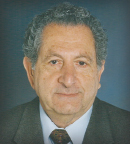
Joseph R. Bertino, MD
Dr. Bertino attributed tacit pressure from his proud Italian immigrant parents to become a doctor. After receiving his undergraduate degree from Cornell University, he attended medical school at SUNY Downstate College of Medicine, attaining his medical degree in 1954. Bent on a career in oncology, Dr. Bertino did a U.S. Public Health Services fellowship in hematology and oncology at the University of Washington School of Medicine. In 1958, he relocated to Seattle to work with Drs. Clement A. Finch and Frank M. Huennekens; the latter’s groundbreaking work in folate metabolism inspired Dr. Bertino’s understanding of how methotrexate worked, which would prove pivotal in his later research.
About 3 years later, Dr. Bertino accepted a joint appointment in the Department of Pharmacology and Medicine at Yale University School of Medicine. In 1973, he became the first Director of the Yale Cancer Center; although he would remain at Yale, he resigned his directorship in 1975, when he was named an American Cancer Society Research Professor. It was a busy year, as Dr. Bertino was also elected President of ASCO.
Dr. Bertino left Yale in 1987 to become Head of Developmental Therapy and Clinical Investigation at Memorial Sloan Kettering Cancer Center (MSK). At MSK, he contributed important papers on drug resistance in leukemia and soft-tissue sarcomas. And during the past 6 years, Dr. Bertino established a translational research laboratory at the Robert Wood Johnson School of Medicine, New Brunswick, New Jersey, becoming Acting Director of its Cancer Center.
In 2002, a former fellow at Yale University, Dr. Hait, invited Dr. Bertino to join him as Associate Director. Bertino focused his research on new drug development for solid tumors, especially prostate and small cell lung cancers. His later investigation would look at new targets for T-cell lymphoma and the rare subtype B-cell lymphoma called double-hit lymphoma.
Along with his major accomplishments in the lab and clinic, Dr. Bertino also left his mark on the literature as founding Editor-in-Chief of the Journal of Clinical Oncology (JCO), where he was remembered as an inspirational teacher and collaborator who has guided many of the current leaders in the field of cancer research.
Gouri Shankar Bhattacharyya, MD, FRCP
The members of the oncology community who spend time and energy addressing the growing global cancer burden in low- and middle-income countries have a kind of selfless dedication beyond the scope of the profession itself. One such medical oncologist was Dr. Bhattacharyya, a valued board member of JCO Global Oncology, who died on April 30, 2021, of COVID-19–related complications.
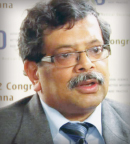
Gouri Shankar Bhattacharyya, MD, FRCP
Speaking at the 2019 ASCO Annual Meeting, Dr. Bhattacharyya said: “We need to develop global health-care policy without playing health-care politics. By that, I mean we can’t have fly-by-night going into low- and middle-income countries saying, ‘We will take care of your burden.’ We have to act with resoluteness and develop a global health-care governance system that prioritizes needs on a per-country basis. We also need to spread awareness within developed nations about addressing global cancer care inequities.”
At the time of his death, Dr. Bhattacharyya led the Department of Medical Oncology at FORTIS Hospital in India. Over his 25-year career, Dr. Bhattacharyya’s special interests were many; in addition to global oncology, they included biologic response modifiers, the tumor microenvironment, palliative care, and geriatric oncology.
In 2013, the International Association for Hospice & Palliative Care presented Dr. Bhattacharyya with a certificate of recognition for Promotion and Development of Palliative Care in the World. Dr. Bhattacharyya was also Past President of the Indian Society of Medical and Pediatric Oncology. He had published more than 200 papers and had been an investigator on more than 50 phase II/III clinical trials.
Before contracting COVID-19, Dr. Bhattacharyya was running for a seat on the International Association for the Study of Lung Cancer (IASLC) Board of Directors. Long known for his efforts to improve the cost of and access to care, Dr. Bhattacharyya was passionate about bridging the gaps in lung cancer education and care by connecting, supporting, informing, and empowering caregivers and the community.
Barrie Cassileth, PhD
In 1999, MSK President Paul Marks, MD, recruited Dr. Cassileth to establish an Integrative Medicine Service that “provided evidence-based complementary therapies to improve patients’ quality of life by alleviating physical and emotional symptoms associated with cancer and its treatments.” Dr. Cassileth led MSK’s program into national prominence, and in 2003, she founded the Society for Integrative Oncology (SIO), through which she oversaw the development of the first of a series of integrative oncology clinical practice guidelines. Dr. Cassileth died on February 26, 2022, at the age of 83.
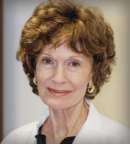
Barrie Cassileth, PhD
A Philadelphia native, Dr. Cassileth graduated from Bennington College and entered Albert Einstein University to pursue a graduate degree in psychology. Her plans changed during her third year there, when she completed her master’s degree early in order to marry her fiancé, who was headed to medical school at the University of Pennsylvania (UPenn). Dr. Cassileth did her dissertation at the UPenn Comprehensive Cancer Center’s inpatient unit for patients with leukemia, where her clinical interaction with dying patients with cancer had a deep effect on her career path.
After receiving her PhD, Dr. Cassileth remained at UPenn as Assistant Professor, teaching medical sociology before taking a turn into uncharted territory to initiate one of the first palliative care programs in the academic setting in the United States. Dr. Cassileth had years of productive research at UPenn, in which she and her associates developed numerous clinical and research programs in patient and family support, medical education, home care and hospice, and the complementary therapies that would eventually lead to the formation of integrative medicine.
In 1992, Dr. Cassileth moved to North Carolina, where she was appointed Consulting Professor of Community and Family Medicine at Duke. In 1999, she was recruited by MSK to create an integrative medicine program, which has served since as an international prototype.
Dr. Cassileth retired from her position as Chief of the Integrative Medicine Service at MSK in 2016 and moved to Southern California to be near her family. Her survivors include three children, Jodi Cassileth Greenspan of New York City and Wendy Cassileth and Gregory Cassileth, both of Los Angeles; a sister; a brother; and six grandchildren.
Leland Chung, PhD
Dr. Chung, who served as Director of the Urologic Oncology Research Program at Cedars-Sinai Cancer in Los Angeles for 12 years and was Professor in the Departments of Medicine and Surgery, died on May 10, 2021, of kidney cancer.
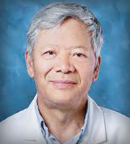
Leland Chung, PhD
Dr. Chung, who held the Board of Governors Cancer Research Chair, earned accolades and renown as a basic-science researcher and leading innovator in prostate cancer biology. The overall goal of his work was to better understand the molecular mechanisms underlying the progression of cancer from primary to distant sites, particularly the biology and targeting of prostate cancer bone metastasis.
Among Dr. Chung’s major accomplishments was his work studying the tumor microenvironment: He characterized the role of cancer and noncancer cell interaction, observing how cells that initiate the spread of cancer recruit bystander cancer cells to participate in metastasis. Dr. Chung also developed molecular imaging, targeting, and agents for cancer prognosis, and he created a three-dimensional model to study tissue and cellular interaction. Additionally, he opened new doors to cancer diagnosis and treatment by developing a near-infrared fluorescent dye, which, when hooked up with a chemotherapy agent, could target tumors.
Born in China, Dr. Chung earned his doctoral degree from the University of Oregon Health Sciences Center’s Department of Pharmacology in 1969 and was a postdoctoral fellow in the Department of Experimental Therapeutics at Johns Hopkins University School of Medicine’s James Buchanan Brady Urological Institute from 1969 to 1972.
Before his tenure at Cedars-Sinai, Dr. Chung held positions at the Emory University School of Medicine, the University of Virginia School of Medicine, and The University of Texas MD Anderson Cancer Center, among other prestigious academic centers. He also held numerous positions on national and international service committees, from the NASA/Biomedical Sciences Investigators Committee to President of the Society of Chinese Bioscientists in America.
This obituary was originally published by Cedars-Sinai in Los Angeles and was adapted with permission for publication in The ASCO Post.
Angelo Di Leo, MD, PhD
Devoted to breast cancer research for more than 25 years, Dr. Di Leo trained with Gianni Bonadonna, MD, in Milan, and conducted postdoctoral research at Jules Bordet in Belgium. He ultimately led his own research unit, most recently serving as Head of the Sandro Pitigliani Medical Oncology Unit at the Hospital of Prato, Istituto Toscano Tumori in Prato, Italy. Dr. Di Leo died on June 13, 2021, after a long struggle with neurodegenerative disease. He was 58 years old.
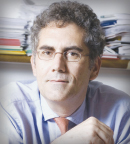
Angelo Di Leo, MD, PhD
Dr. Di Leo coordinated several pivotal phase III international trials in new adjuvant therapies. He was deeply involved in the evaluation of molecular markers with potential predictive value for breast cancer. The author of many peer-reviewed articles, he lectured extensively at national and international meetings. His outstanding contributions to the field were recognized by the European Society for Medical Oncology, which awarded him its Lifetime Achievement Award in 2019.
Among his many significant contributions throughout a distinguished career, Dr. Di Leo showed that a gene signature—called RBsig, which reflects a loss of function of the retinoblastoma tumor-suppressor gene—is less likely to respond to chemotherapy and may benefit more from targeted, potentially less-toxic therapies such as cyclin-dependent kinase 4 and 6 inhibitors. His team launched a prospective multicenter, international clinical trial to test the correlation between RBsig and clinical outcomes in older women with estrogen receptor–positive/HER2-positive early-stage breast cancer. Ongoing trials will help inform treatment decisions for the care of older patients with breast cancer by indicating which of them may forgo chemotherapy for less-toxic treatments while preserving optimal clinical outcomes.
Dr. Di Leo’s translational research unit at Prato has also been dedicated to investigating molecular features of circulating tumor cells. His team demonstrated the ability to isolate single circulating tumor cells and then perform whole-genome amplification followed by gene sequencing for mutations of PIK3CA and other relevant genes. This pioneering work has the potential to identify key drivers of resistance and proliferation that could be targeted with therapy.
James Edney, MD
Dr. Edney, Professor Emeritus in the Department of Surgery at The University of Nebraska Medical Center (UNMC) in Omaha, died on August 7, 2021, in a small plane crash in Minnesota.
UNMC Chancellor Jeffrey P. Gold, MD, said in a statement to the University:“The UNMC community mourns the loss of Dr. Edney, a respected and caring physician and educator. He was recognized by both his students, colleagues, and his patients for his caring and commitment. We send our condolences to the Edney family, as well as our gratitude for the lives he touched and the people he helped at the university and throughout the community and region.”
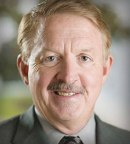
James Edney, MD
Dr. Edney earned his bachelor’s degree from Creighton University in 1971 and his medical degree from UNMC in 1975. From 1975 to 1980, he did a residency in general surgery at UNMC followed by a 1-year fellowship in surgical oncology at the University of Colorado in Denver before returning to UNMC in 1981. He was Professor Emeritus in the UNMC Department of Surgery and former Division Chief of Surgical Oncology.
Dr. Edney formerly served as President of the Southwestern Surgical Congress and the Western Trauma Association and was a member on the Commission on Cancer of the American College of Surgeons. Among his numerous awards is a Golden Apple Teaching Award he received in 1995 from UNMC surgery resident physicians.
David W. Mercer, MD, Chair of the UNMC Department of Surgery, said Dr. Edney was a colleague and a friend: “I will miss him and will always be indebted to him for encouraging me to come to UNMC. He impacted me, as he did so many others, with his caring and kindness—to say nothing of the many patients he helped throughout his medical career.”
Elihu H. Estey, MD
“A lot of times, younger bright physicians are afraid to say what they really think, out of fear of challenging the dogma. One of the things I do when mentoring is to ask why we are doing a particular therapy or intervention. I tell my mentees not to let the data interfere with your knowledge,” said Dr. Estey during an interview at the 2018 Annual Meeting & Exposition of the American Society of Hematology. Dr. Estey, an expert in acute myeloid leukemia (AML), was known throughout the oncology community as a physician who always challenged the dogma and never let the data interfere with his knowledge. Dr. Estey died on October 8, 2021, at age 75. At the time of his passing, he was Professor of Hematology and Medicine and Director of the AML Clinical Research Division at Fred Hutchinson Cancer Research Center, Seattle.
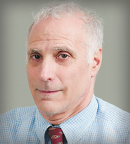
Elihu H. Estey, MD
Dr. Estey received his degree in mathematics at Yale University, New Haven, Connecticut, before attending medical school at Johns Hopkins University, Baltimore. He completed residency training in neurology at New York’s Bellevue Hospital, which eventually led him to an interest in brain tumors. Following his new interest in oncology, Dr. Estey went on to The University of Texas MD Anderson Cancer Center, Houston, where his career bloomed under the guidance of giants in the field.
During a 2017 interview with The ASCO Post, Dr. Estey noted: “I spent 28 incredible years at MD Anderson, where I was influenced by great mentors such as Drs. Emil J Freireich and Michael Keating.” In 2008, he and his family moved to Seattle, where he became Professor at the University of Washington and Fred Hutchinson Cancer Research Center and where he built one of the largest clinical AML programs in the United States.
Although Dr. Estey’s vast array of friends and colleagues noted that many adjectives described him—iconoclastic, skeptical, brilliant, original—more than anything, he stood for basic and unyielding common sense. As best described in his own words: “Our major blockade to a cure is lack of knowledge. In generations to come, researchers who have that knowledge will look back at us in the same way that we look at doctors who put leaches on George Washington, although they were perhaps the best doctors of their day.”
Dr. Estey is survived by his wife, Dr. Cynthia David; his children, Andrew and Emily; and his beloved dog, Hutch.
David Morse Livingston, MD
Dr. Livingston, formerly the Charles A. Dana Chair in Human Cancer Genetics at Dana-Farber and the Emil Frei III Distinguished Professor of Medicine at Harvard Medical School, died unexpectedly on October 17, 2021. He was Deputy Director of the Dana-Farber/Harvard Cancer Center (DF/HCC) from 2000 to 2019 and was Director and Physician-in-Chief of Dana-Farber from 1991 to 1995. He was a member of the DF/HCC Executive Committee and a member of the Dana-Farber Executive Committee for Research.
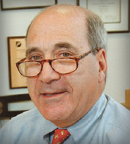
David Morse Livingston, MD
A prominent expert on the molecular origins of breast and ovarian cancers, Dr. Livingston focused his research on genes that regulate cell growth, including the tumor suppressor genes Rb, p300/CBP, BRCA1, and BRCA2. His work has been the cornerstone of many studies of cancer susceptibility linked to BRCA function and mutations. By understanding the tumor suppressive properties of BRCA1 and BRCA2, he paved the way for studying novel approaches to breast and ovarian cancer prevention.
Dr. Livingston was born in Cambridge, Massachusetts, and grew up in Salem. He received his bachelor’s degree, cum laude, from Harvard University in 1961 and his MD, magna cum laude, from Tufts Medical School in 1965. He trained in internal medicine at Peter Bent Brigham Hospital and did his scientific training at the National Cancer Institute and Harvard Medical School. He joined the Harvard and Dana-Farber faculty as Assistant Professor of Medicine in 1973.
Among his many awards and achievements, he received the Pezcoller Foundation–American Association for Cancer Research (AACR) International Award in 2017, recognizing his significant contributions to translational cancer research. In 2019, he was recognized for his remarkable 45 years of service to Dana-Farber. Dr. Livingston was a member of the U.S. National Academy of Medicine and the U.S. National Academy of Sciences. He had been a member of editorial boards of numerous scientific journals and authored or coauthored more than 235 published scientific articles, including within the past year.
In addition to his wife, Emily, and his daughter, Catherine, of Washington, DC, Dr. Livingston is survived by another daughter, Julie Livingston, of New York City; a stepson, Jeremy Maltby, of Washington, DC; and five grandchildren.
Francisco Marty, MD
An innovator in the treatment of infectious diseases and a longtime affiliate of Boston’s Brigham and Women’s Hospital, Dr. Marty died April 8, 2021, after an accident while hiking in the Dominican Republic. He was 53.
Dr. Marty earned his medical degree from José María Vargas School of Medicine, Universidad Central de Venezuela, and completed his residency at the Jacobi Medical Center of Albert Einstein College of Medicine in New York, where he served as chief resident. He completed his infectious diseases fellowship at the Brigham.
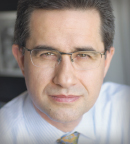
Francisco Marty, MD
A member of the Brigham community for more than 20 years, Dr. Marty is remembered as a masterful physician, researcher, and mentor who specialized in the treatment of infectious diseases affecting patients with cancer and transplant recipients. Along with Lindsey Baden, MD, he built and led the clinical infectious disease consult service for patients at Dana-Farber Cancer Institute. In addition to his work at the Brigham, he was Editor-in-Chief of the journal Transplant Infectious Disease.
As a scientist, Dr. Marty led numerous multicenter trials to study the safety and efficacy of novel treatments for influenza, cytomegalovirus, invasive fungal infections, and COVID-19. Most recently, he was the principal investigator for two clinical trials that looked at the use of the antiviral medication remdesivir for patients with COVID-19. They were among several studies that led the U.S. Food and Drug Administration to expand its emergency use authorization for remdesivir to treat all hospitalized patients with COVID-19.
Beatrice Mintz, PhD, FAACR
The AACR issued the following statement regarding the passing of Dr. Mintz, the 2012 recipient of the AACR Award for Lifetime Achievement in Cancer Research. A pioneer in multiple fields of cancer biology, Dr. Mintz died January 3, 2022, at the age of 100.
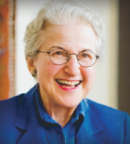
Beatrice Mintz, PhD, FAACR
Born on January 24, 1921, in New York City, Dr. Mintz graduated magna cum laude from Hunter College and earned a master’s degree in 1944 and a doctorate in 1946 from the University of Iowa. She received a Fulbright research fellowship at the Universities of Paris and Strasbourg in 1951.
Dr. Mintz was Professor of Biological Science at the University of Chicago from 1946 to 1960 and then transitioned to a faculty position at Fox Chase Cancer Center, where she remained for the rest of her career. She held several different positions at Fox Chase, including the Jack Schultz Chair in Basic Science from 2002 to 2019. She also served as Adjunct Professor at the University of Pennsylvania.
During her distinguished career, Dr. Mintz made unprecedented discoveries in several different aspects of biology, including developmental genetics, gene-transfer technology, embryology, epigenetics, and the tumor microenvironment. She was the first to propose that chimeric mice could be constructed in a manner that would allow for two genetically distinct cell populations to coexist throughout life. In such animals, specific cell lineages became detectable, which led her to ascertain that development involves an expanding succession of progressively restricted stem cells that are able to proliferate clonally and subsequently differentiate into desired cell types.
This led her to postulate that cancer represents an aberration of development in which proper cellular homeostasis is modified in favor of proliferation, which may be further exacerbated by genetic insults. Dr. Mintz next demonstrated that transgenic mice could be engineered by modifying genes in utero, which allowed for mouse models of specific cancers to be purposely developed for future research.
Furthermore, Dr. Mintz demonstrated the importance of the local cellular environment in governing cellular behavior, especially stem cells. In a groundbreaking experiment, she showed that early carcinoma stem cells could be stably normalized if transferred to a normal cellular environment appropriate for their developmental stage. Her research findings and breakthroughs have since been leveraged by countless cancer researchers to establish specific mouse models of cancer. Her model of cutaneous melanoma, in particular, became a widely used research tool.
Franco M. Muggia, MD
Today’s life-saving chemotherapeutics originated from the vision and indefatigable work of pioneers in the field whose unwavering vision challenged the status quo. One such pioneer was Dr. Muggia, who, in a career lasting more than 50 years, had a hand in the development of some of the most important drugs in chemotherapy, including bleomycin, nitrosoureas, taxanes, and his key area of interest, platinum compounds. A fixture at New York University (NYU) Langone’s Perlmutter Cancer Center and a leader in the study and treatment of patients with gynecologic cancers, Dr. Muggia died on September 8, 2021. He was 85 years old.
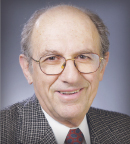
Franco M. Muggia, MD
Born in Turin, Italy, Dr. Muggia fled with his family to Quito, Ecuador, to escape the Mussolini dictatorship when he was 3 years old. He immigrated to the United States in 1952 and obtained his undergraduate degree in biophysics at Yale College, after which he went to New York and Cornell University Medical College. After a stint on the faculty at Albert Einstein College of Medicine, Dr. Muggia, who would become a U.S. citizen in 1964, volunteered for the Public Health Service, securing a position at the Medicine Branch of the NCI. The main focus of his research at the NCI was developing new oncology agents, such as camptothecin, teniposide, nitrosoureas, bleomycin, and eventually paclitaxel and cisplatin.
After 3 years at the NCI, Dr. Muggia returned to Albert Einstein College of Medicine, after which he went back to the NCI in 1975. In 1979, he returned to full-time clinical plus administrative work as Head of Medical Oncology and Director of Clinical Programs at NYU. After 7 years at this quickly expanding program, he accepted a position at the University of Southern California Norris Comprehensive Cancer Center in Los Angeles.
In 1994, Dr. Muggia returned to New York to rejoin his colleagues at NYU, resuming the same position he had held 10 years previously. In 2014, he stepped down from his administrative roles and began the process of honing his full-time work to something that resembled a half-time schedule. He noted that a wise friend from college cautioned him that cutting down from 150% (normal for physicians) to 100% does not constitute a part-time job. To that end, he reported that although his half-time schedule was “more like three-quarters,” it allowed him to make good use of his extra leisure time by keeping up with oncologic advances and sharing his “philosophical musings.”1 Unfortunately, Dr. Muggia died before being able to fulfill his 10-year dream of compiling his stored memories into a collective body. However, his contributions to the field of oncology remain alive in cancer care clinics and survivorship meetings across the world.
REFERENCE
1. Muggia FM: The benefits of reducing my hours to half-time (that is, three-quarter time). Clin Adv Hematol Oncol 18:394-395, 2020.
Donald P. Pinkel, MD
When St. Jude Children’s Research Hospital was opened in 1962, childhood blood cancer, especially acute lymphoblastic leukemia (ALL), had an exceptionally grim prognosis. However, years of unflagging clinical research led by Dr. Pinkel, the pediatrician who developed an aggressive leukemia regimen, turned what was once a virtual death sentence into a curable disease. Dr. Pinkel died at his home in San Luis Obispo, California, on March 9, 2022. He was 95.
Dr. Pinkel graduated from Buffalo’s Canisius High School in 1944 and enlisted in the U.S. Navy later that year. He participated in the V-12 Navy College Training Program, where he studied biology and medicine at Cornell University. After returning home and graduating in 1947 from Canisius College, Dr. Pinkel went directly to medical school, at what is now the University of Buffalo. He earned his medical degree in 1951; after his residency and fellowship in pediatrics, he was recruited by the Army Medical Corps and sent to a military hospital outside Boston.
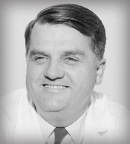
Donald P. Pinkel, MD
The national polio epidemic was raging, and Dr. Pinkel, the only staff pediatrician, contracted polio himself. “I thought I was immune to it,” he said during an interview with the Cancer History Project. “We had big epidemics in Buffalo in the 1950s, and I took care of hundreds of children with polio. While [I was] hospitalized at Fort Devens, my respiratory function went down to a small fraction. I remember going to sleep one night and thinking, well, this is it. I’m not going to wake up.”
As his condition improved, Dr. Pinkel accepted a position as a researcher with acclaimed oncologist Sidney Farber, MD, doing early research in novel leukemia agents. This was the beginning of a meteoric rise in Dr. Pinkel’s career, as he soon returned to Buffalo; there he led a pediatrics program at Roswell Park Cancer Institute (now Roswell Park Comprehensive Cancer Center), working alongside another luminary in cancer research, James Holland, MD.
In 1961, Dr. Pinkel received what would be a career-defining offer to become the Chief Medical Officer of St. Jude. In 1970, just 8 years into his tenure at St. Jude, Dr. Pinkel was able to make an extraordinary pronouncement: “Childhood leukemia can no longer be considered an incurable disease.” The hospital was seeing a 50% cure rate—and had the literature to prove it. Building on protocols he and his staff established at St. Jude, the survival rate for most types of childhood ALL now hovers at around 94%.
Dr. Pinkel later worked at children’s hospitals in Wisconsin, California, Pennsylvania, and Texas before retiring in 1994. He then moved to San Luis Obispo to be near some of his children and later taught as an adjunct at California Polytechnic State University.
Dr. Pinkel is survived by his second wife, Cathryn Howarth; six daughters, Rebecca Amthor, Nancy Pinkel, Mary Pinkel, Noelle Greene, Sara Pinkel, and Ruth Pinkel; three sons, John, Thomas, and Michael; his sister, Eileen Pinkel; 16 grandchildren; and 5 great-grandchildren. Another son, Christopher, died in 2019.
Clayton Dunklin Pruett
The delivery of high-quality cancer care relies on a vast network of dedicated experts, some of whom work assiduously behind the scenes, building and modernizing the very architecture on which the cancer community operates. One such person was Mr. Pruett, an engineer by training, who followed his passion into the challenging world of oncology, where, among other things, he helped create ASCO’s successful business model, becoming one of the Society’s first nonphysician members. Mr. Pruett died at his home in Rancho Mirage, California, on July 24, 2021. He was 86.
A native of Montgomery, Alabama, Mr. Pruett received a Bachelor of Science degree from Auburn University in 1956, after which he served as a Lieutenant in the U.S. Air Force, where he worked on top secret projects involving human sensitivity to radiation. After his military service, he took a position as staff Associate General, Atomic Division, General Dynamics, La Jolla, California, which initiated his lifelong interest in the world of cancer care.
In 1973, Mr. Pruett started CDP Services, which began working with the National Institutes of Health in program development to assist patients with cancer and their caregivers. He established programs with academic medical centers around the country, adding cancer-focused programs and services. These services evolved into the NCI comprehensive cancer center programs. Mr. Pruett spent the next 40-plus years developing a series of companies focused on improving the care and outcomes for patients with cancer and their providers.
His innovative companies established the first evidence-based cancer clinical care guidelines and the first private cancer clinical trials network. This network brought the latest investigational treatments to eligible patients in communities across the United States.
In addition, Mr. Pruett helped to establish the Association of Community Cancer Centers, which has grown into a national association with more than 28,000 active members. He also was a key advisor in pediatric oncology in the formation of the NCI’s Children’s Oncology Group. In 2011, Mr. Pruett took a lead position in the nationally recognized Oncology Management Consulting (OMC) Group.
Throughout his long career in oncology, Mr. -Pruett was known for his drive and determination, to help better the delivery of cancer care. He credited his early background in civil engineering as the structural underpinning that helped his career as a biotech company executive and “modernizer” in the oncology space. Most recently, he helped form and lead a global study sponsored by the International Association for the Study of Lung Cancer study on the impact of COVID-19 on lung cancer clinical trials. He was actively working on that study up until the time of his death.
Mr. Pruett is survived by his wife, Kim; sons, Blair and Tyler; and five grandchildren.
Tahir Shamsi, MBBS, MRCPath, FRCPath
Although bone marrow transplantation is routinely employed in the United States and other wealthy nations, this costly life-saving procedure has struggled to gain a foothold in many low- to moderate-income countries, where resources are triaged to make the best use of precious health-care funding. With unflagging dedication, Dr. Shamsi introduced bone marrow transplantation to Pakistan in 1996, becoming the nation’s leader in treating hematologic malignancies. Dr. Shamsi died at Aga Khan University Hospital in Karachi on December 21, 2021, after a brain hemorrhage. He was 59 years old.
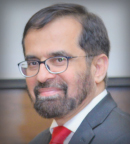
Tahir Shamsi, MBBS, MRCPath, FRCPath
Dr. Shamsi received his medical degree in 1988 from Dow Medical College, a public medical school in Karachi, after which he attained his postgraduate degree from London’s Royal College of Pathologists.
Dr. Shamsi eventually returned to Pakistan and began setting up a cancer care program at Ziauddin Hospital, where he trained many medical professionals in hematology, as well as stem cell transplantation and research. In 1995, he performed the first bone marrow transplant in Pakistan while -treating a 19-year-old patient with blood cancer in Karachi.
In 2011, Dr. Shamsi established Pakistan’s National Institute of Blood Disease and Bone Marrow Transplantation. In recognition of his services, a lifetime achievement award was conferred on him by the Dow Graduates Association of North America in 2016. During his career, he performed 650 bone marrow transplants and was the author of more than 100 research articles.
Pakistan Medical Association Secretary General Qaiser Sajjad, MBBS, DLO, MS (ENT), noted: “Dr. Tahir Shamsi’s death is an irreparable loss for the community. He did an excellent job of establishing a bone marrow transplant facility in the country.” Dr. Sajjad added that along with his medical accomplishments, Dr. Shamsi was a “thorough gentleman” who was “very humble, cooperative, and supportive” with his patients.
Pakistan President Arif-ur-Rehman Alvi expressed his condolences on the death of the renowned doctor and prayed for the “departed soul and strength for his family to bear the loss.” The president also took to his official Twitter account to state that Dr. Shamsi had “rendered outstanding services in the field of medicine and research and will be remembered for his services in bone marrow transplant and other leukemia treatments.”
Dr. Shamsi was married in 1990 and is survived by his wife, Uzma Tahir Shamsi, as well as two sons, Usama and Umer, and three daughters, Tooba, Mahnoor, and Zoha.
Gauri Varadhachary, MD
Dr. Varadhachary, Clinical Professor in Gastrointestinal (GI) Medical Oncology at The University of Texas MD Anderson Cancer Center, died on June 5, 2021. She was 52. A member of the MD Anderson community for nearly 20 years, Dr. -Varadhachary was remembered for her dedication to her patients, her selfless mentorship, and her compassionate leadership in a tribute from the MD Anderson Cancer Center, reprinted here.
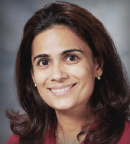
Gauri Varadhachary, MD
“Gauri was a natural, soft-spoken leader who built consensus and developed action plans without fanfare,” said Robert Wolff, MD, Professor of GI Medical Oncology at MD Anderson. Dr. Wolff noted that Dr. Varadhachary was widely respected for her service as Center Medical Director of the GI Cancer Center, where she embraced the center’s Goals of Care initiatives and served on the ICU Utilization Review Committee. Most recently, she gave much of her time to organizing COVID-19 vaccination efforts for patients at MD Anderson, which helped set the national standard for immunocompromised patients with cancer.
In addition to her work with MD Anderson’s GI Cancer Center, Dr. Varadhachary served as Special Advisor to the Chief Medical Officer and then the Chief Medical Executive. In this role, she provided strategic guidance on building the physician leadership structure across the ambulatory and inpatient spheres, and she provided collaborative leadership on several major initiatives that greatly and positively impacted patients and the institution.
Dr. Varadhachary joined MD Anderson in 2003 as Assistant Professor of GI Medical Oncology, becoming Associate Professor in 2006 and full Professor in 2012. Throughout her career, she was known for her dedication to quality patient care and for her generosity with her time, energy, and empathy.
A leading expert in the diagnosis and treatment of occult primary tumors, Dr. Varadhachary served as Vice Chair of the National Comprehensive Cancer Network’s Guidelines Subcommittee for Occult Primary tumors. Her active research portfolio in pancreatic cancer helped define borderline resectable pancreatic cancer and a multidisciplinary management strategy.
Dr. Varadhachary was known to have a fierce love of her family and to enjoy good food and travel. She is survived by her husband, Atul Varadhachary, MD, PhD, and her two daughters, Riya and Tanvi.

